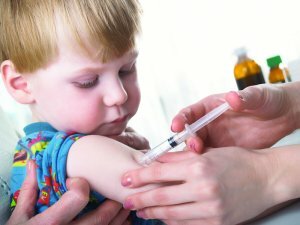What vaccines do in Europe
 Not so long ago, mankind massively died out of infections, which sometimes devastated entire cities. The bubonic plague and smallpox that raged in the Middle Ages washed small states from the face of the earth. But now people are saved with the help of modern medical advances - most of the "at a time" is prevented due to timely vaccinations. First of all, it is necessary to protect children from diseases. Therefore, the current generation can be called "vaccine-dependent".
Not so long ago, mankind massively died out of infections, which sometimes devastated entire cities. The bubonic plague and smallpox that raged in the Middle Ages washed small states from the face of the earth. But now people are saved with the help of modern medical advances - most of the "at a time" is prevented due to timely vaccinations. First of all, it is necessary to protect children from diseases. Therefore, the current generation can be called "vaccine-dependent".
A Brief History of
One of the first countries that showed interest in such treatment of infectious diseases was the United Kingdom. Encouraged by the example of the Turks, the wife of the English ambassador, who at that time lived in Osmania, vaccinated her children from smallpox, and later organized a study on prisoners sentenced to death. The results of the experiments were so impressive that a significant part of the high society in the  of England began to be vaccinated. The case dates back to the 18th century, when in China, for example, vaccinations were first mentioned in 20.
of England began to be vaccinated. The case dates back to the 18th century, when in China, for example, vaccinations were first mentioned in 20.
Vaccines for pertussis, plague and other infections that were previously considered fatal have been gradually developed. After the introduction of mandatory vaccinations, the number of diseases, until then, freely walked around the planet, fell at times.
Vaccination system in Europe
Europe has established a clear system of immunization. So millions of lives were saved, disabilities caused by severe infections were prevented. Vaccination also helps to save funds that relate to productivity and to some extent reduces the cost of treating diseases.
The list of necessary vaccinations in each country of Europe was made by trial and error. In the 1970s, due to the shortcomings of the vaccine against pertussis, certain states refused to use it. These include Sweden, Italy and Germany. This actually led to an epidemic, which was the impetus for the development of a better vaccine.
Each country has its own personal calendar of preventive vaccinations, based on the prevalence of infectious diseases in a particular region and the calculation of the risk of infection at different ages. Today immunization in Europe is designed so well that vaccination will not pose even a small threat to children.
Mandatory vaccinations
This calendar includes about 15 vaccinations: measles, tetanus, whooping cough, diphtheria, poliomyelitis, mumps, hepatitis B, pneumococcal infection, rubella, hemophilia, chickenpox and others.
Vaccination is not mandatory in most European countries( in Italy and France, 3 vaccinations are mandatory, in Belgium - 1)."Infringement" of civil rights in case of refusal of a shot is not provided - the child will be freely admitted to a kindergarten or school. But actively working commissions, which promote immunization.
An example of the necessary vaccinations can be called:
- Tetanus. Because any active child in his irresistible desire for knowledge without difficulty is able to get hurt in "unsanitary" conditions even under the increased supervision of parents.
- Poliomyelitis. This vaccination is easily tolerated, and in Europe it is covered by insurance.
- Hepatitis B. The disease is transmitted by the "household" way - for example, through saliva, things or tears. A sick person, even without knowing what is contagious, can just sneeze at the baby and that's enough for infection.
- Immunizations from allegory - desensitization.
- Bronchitis. It is paid by insurance.
- Influenza. Rubella, measles, chickenpox. The most common among children. At school, on the street, in the waiting room of a doctor - you can grab them anywhere.
In some countries of Europe there is a so-called "six-in" vaccination - six vaccinations at a time. Includes pertussis, diphtheria, tetanus, meningitis, poliomyelitis and hepatitis B. It is done for the first time in about five months. Then it is repeated twice every 8 weeks. In 14-16 months, rubella, measles and parotitis follow, it is necessary to repeat for 6 months( but not earlier than 8 weeks).In addition, it is possible to make some inoculations, which are paid - pneumococcus, meningococcus, encephalitis.
The World Health Organization( WHO) expresses concern about the growth of the anti-vaccination movement in Europe. In Germany, Austria and Switzerland, entire schools refuse to vaccinate children, which threatens the spread of measles and poliomyelitis.
However, with the current quality of immunization significantly improved in the last ten years, even a weak child can withstand vaccination without adverse effects or complications. Moreover, an infectious disease can be transferred much harder than a reaction to an inoculation.



